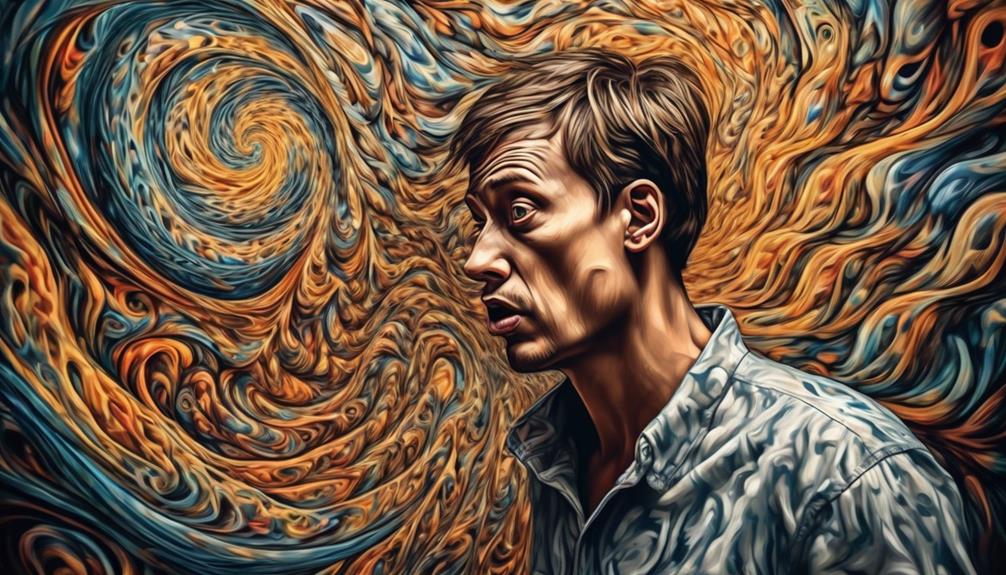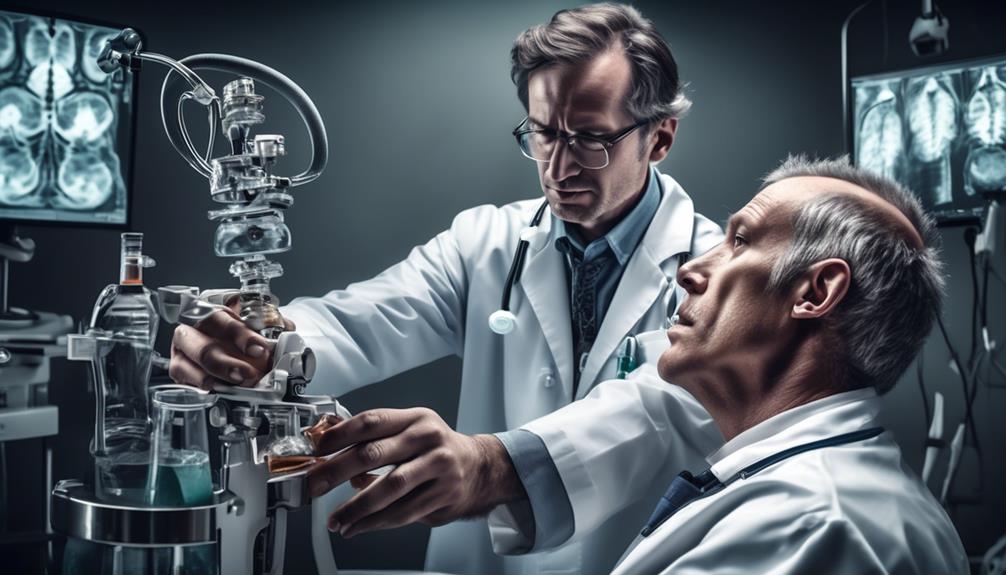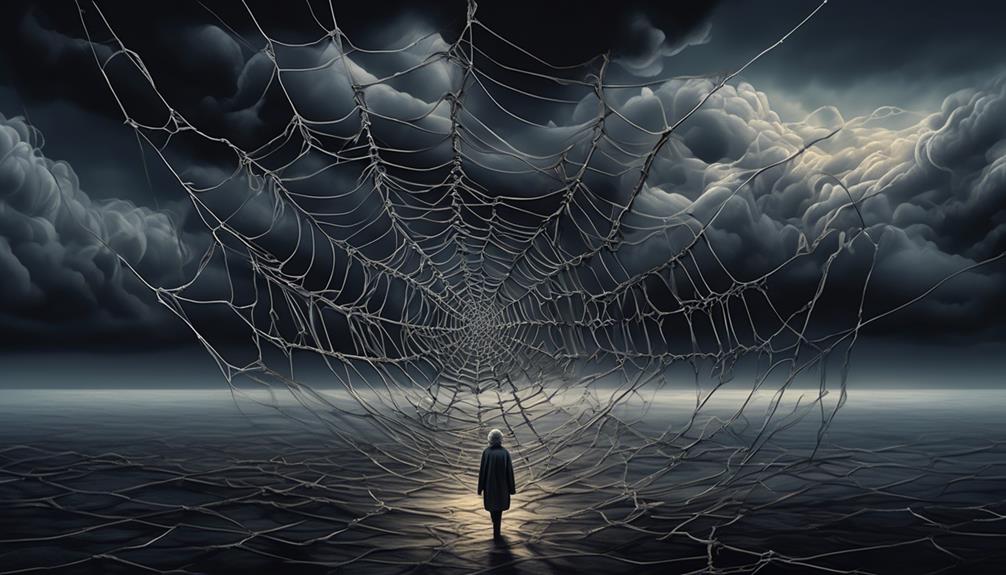Investigating the complex effects of alcohol on the brain can be likened to navigating a foggy forest, where illusions may hide within the mist.
A friend once recounted an evening where after consuming a few too many drinks, they began hearing whispers that seemed to emanate from the shadows. It left them shaken and questioning the reality of their surroundings.
Can alcohol truly cause hallucinations, or was it just a one-time anomaly?
Let's explore this intriguing phenomenon further to shed light on the connection between alcohol and hallucinations.
Key Takeaways
- Alcohol hallucinosis is a manifestation of severe alcohol withdrawal with auditory hallucinations.
- Chronic alcohol abuse and genetic predisposition increase the risk of alcohol-induced hallucinations.
- Alcoholic hallucinosis differs from delirium tremens, a more severe condition with physical symptoms.
- Maintaining abstinence from alcohol and seeking early intervention are crucial in preventing alcohol-related hallucinations.
Understanding Alcohol-Induced Hallucinations
When exploring the phenomenon of alcohol-induced hallucinations, it's crucial to understand the distinct characteristics and potential risks associated with this condition.
Alcohol hallucinosis, a manifestation of severe alcohol withdrawal, presents with auditory hallucinations, paranoid symptoms, and fear. These hallucinations are often derogatory or commanding, sometimes escalating to violent or suicidal behaviors. Notably, this condition differs from alcohol psychosis and delirium tremens (DTs) due to the presence of delusions, inappropriate actions, and physical symptoms.
Alcohol-induced hallucinations can arise during acute intoxication and withdrawal, as well as in cases of chronic alcohol use disorder. The disruption of neurotransmitters, particularly dopamine and serotonin, plays a crucial role in triggering these hallucinations. While auditory hallucinations are the most common, other sensory distortions like visual, tactile, olfactory, and gustatory hallucinations can also occur.
Risk factors for alcohol-induced hallucinations include heavy and prolonged drinking, substance abuse, genetic predisposition, age, pre-existing mental health conditions, and low socioeconomic status. Proper assessment for psychotic symptoms is essential to differentiate alcohol hallucinosis from other pathologies and provide appropriate interventions.
Symptoms and Risk Factors

Characterized by auditory hallucinations, paranoid symptoms, and fear, alcoholic hallucinosis is a condition that can result in violent behaviors and is often triggered by changes in alcohol intake or withdrawal. Patients with chronic alcohol abuse are at a higher risk of developing this psychotic disorder.
Symptoms of alcoholic hallucinosis include:
- Auditory hallucinations, such as hearing voices or sounds that aren't real.
- Paranoid symptoms, leading individuals to believe they're being watched or followed.
- Intense fear and anxiety, contributing to the overall distress experienced by patients.
Chronic alcohol abuse, along with factors such as genetic predisposition, age, and pre-existing mental health conditions, can increase the likelihood of developing alcoholic hallucinosis. It's crucial to recognize the symptoms and risk factors associated with this condition to provide appropriate support and treatment for affected individuals.
Alcoholic Hallucinosis Vs. Delirium Tremens
Alcoholic hallucinosis and delirium tremens are both alcohol withdrawal syndromes with distinct characteristics and levels of severity.
Alcoholic hallucinosis, often seen in individuals with a history of heavy alcohol consumption or chronic alcohol abuse, presents with auditory hallucinations, paranoid symptoms, and fear. These hallucinations are typically third person auditory, resembling those experienced in psychotic disorders like paranoid schizophrenia.
On the other hand, delirium tremens, a more severe condition, manifests after 48 to 72 hours of acute alcohol intoxication cessation. It's characterized by tremors in the hands, head, and body, along with confusion, seizures, and potential mortality if left untreated.
While both conditions require medical attention, delirium tremens poses a higher risk. Recognizing the early warning signs of alcoholic hallucinosis and delirium tremens, such as hallucinations or tremors, and seeking prompt medical intervention is crucial in managing these alcohol withdrawal symptoms effectively.
Diagnosis and Treatment Approaches

Moving from the distinction between alcoholic hallucinosis and delirium tremens, the focus now shifts to understanding the diagnosis and treatment approaches for alcohol-induced hallucinations. When dealing with alcohol-induced hallucinations, it's crucial to consider the severity of alcohol withdrawal and the specific symptoms of alcoholic hallucinosis.
Diagnosis and treatment approaches for alcohol-induced hallucinations typically involve the following:
- Medical Evaluation: Diagnosis of alcohol-induced hallucinations requires a comprehensive medical and psychiatric assessment to rule out other potential causes and determine the appropriate course of treatment.
- Medication and Therapy: Treatment for alcohol-induced hallucinations may include the use of medications such as antipsychotics and benzodiazepines to manage hallucinations and withdrawal symptoms. Additionally, therapy, such as cognitive-behavioral therapy, can help individuals address underlying issues contributing to their alcohol use and develop effective coping strategies.
- Support Groups: Engaging in support groups like Alcoholics Anonymous can provide valuable peer support, guidance, and encouragement for individuals seeking to maintain sobriety and navigate the challenges associated with alcohol-induced hallucinations.
Preventing Alcohol-Related Hallucinations
To prevent alcohol-related hallucinations, maintaining abstinence from alcohol is the most effective approach. Seeking early intervention and treatment for alcohol use disorder is crucial in reducing the risk of developing hallucinations. Avoiding heavy and prolonged alcohol consumption is also essential as it can increase the likelihood of experiencing hallucinations.
Factors such as alcohol withdrawal delirium, alcoholic hallucinosis, and delirium tremens can occur due to excessive alcohol consumption, highlighting the importance of addressing alcohol addiction through proper addiction treatment.
Maintaining a healthy lifestyle that includes regular exercise, proper nutrition, and adequate sleep can support overall brain health and help reduce the risk of alcohol-related hallucinations. Seeking support from healthcare professionals, therapists, and support groups is important to address any underlying mental health issues and develop effective coping strategies to prevent hallucinations.
It's also crucial to be aware of the potential interactions between alcohol and other substances, such as cocaine or psychedelic drugs, as they can increase the risk of hallucinations. If experiencing alcohol withdrawal symptoms, seeking medical help is vital to safely manage the process and minimize the risk of hallucinations.
Frequently Asked Questions
What Is Alcohol Psychosis?
Alcohol psychosis is a condition characterized by hallucinations, disorganized thinking, and inappropriate behavior. It can occur during acute intoxication, withdrawal, or chronic alcohol abuse.
Alcohol disrupts brain neurotransmitters, affecting mood, perception, and reality. Hallucinations may involve all five senses.
Seeking treatment for alcohol abuse is crucial in addressing psychosis and preventing severe complications. Assessing for other psychotic symptoms is vital to exclude underlying pathologies.
Can Alcohol Trigger Schizophrenia?
Alcohol can trigger schizophrenia in vulnerable individuals. The effects on neurotransmitters can contribute to the onset or exacerbation of the condition. Factors like heavy drinking, genetics, and pre-existing mental health issues can increase the risk.
Seeking professional help and support is crucial in managing these complex interactions. Understanding the potential link between alcohol and schizophrenia can aid in making informed decisions about alcohol consumption for those at risk.
Can Alcohol Cause Mental Illness?
Absolutely, alcohol can indeed cause mental illness. Chronic alcohol abuse can lead to various mental health issues, including depression, anxiety, and even psychosis. These conditions can significantly impact one's quality of life and overall well-being.
Seeking help and support is crucial for managing these challenges effectively and improving mental health outcomes. Remember, it's okay to reach out for assistance when struggling with mental health concerns related to alcohol use.
What Are the Four Types Observed in Wives of Alcoholics?
When considering the four types observed in wives of alcoholics, it's essential to recognize the impact of alcoholism on relationships. These types may include enabler, hero, scapegoat, and lost child. Each plays a distinct role in the family dynamic, often adapting to cope with the challenges of living with an alcoholic spouse.
Understanding these roles can help provide insights into the complexities of alcoholism's effects on loved ones.
Conclusion
In conclusion, alcohol can indeed cause hallucinations, specifically in the form of alcoholic hallucinosis. Understanding the symptoms and risk factors, distinguishing it from delirium tremens, and seeking proper diagnosis and treatment are crucial steps in managing this condition.
By staying abstinent from alcohol and taking preventive measures, individuals can prevent the recurrence of alcohol-related hallucinations.
Remember, knowledge and awareness are key in addressing this rare complication of chronic alcohol use.









